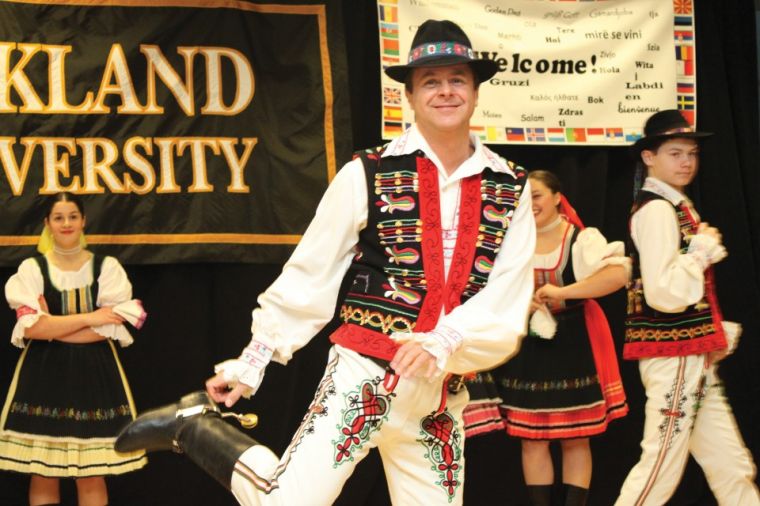Students get taste of Europe at event
Students gathered Friday night for a literal taste of foreign culture as European Night commenced in the Oakland Center. The evening was sponsored by more than a dozen student organizations.
Free and open to all OU students, faculty and staff, European Night was met by a crowd of visitors. The bustling activity lasted from 4-7 p.m., while guests met and then exceeded the seating capacity of the OC Gold Rooms.
With an extra credit incentive for his German 215 class, junior Mark Seefried sampled the international flavor.
“I was surprised to see every chair filled,” Seefried said. “People were actually standing. The room really filled up quickly.”
However, freshman Benjamin Eveslage, president of International Allies, wasn’t surprised with the turnout.
“We (International Allies) expected this number of people, ” he said. “This is one of the biggest events that we sponsor.”
Eveslage contributed the event’s popularity largely to the diverse collection of people that helped make it happen.
“Numerous organizations put this event together,” he said. “Cooperative events like this are the most effective. European Night combined different aspects of cultural festivals together, and it’s worked really well.”
Dikka Berven, special instructor of French, is the faculty advisor to OU’s French Club. According to Berven, French Club always looks forward to European Night. This year, club members served as masters of ceremony for the multicultural entertainment.
“International events offer the opportunity to get to know students from other cultures, to have fun together, and to get a glimpse of how people do things in other countries,” Berven said.
The cultural stage was set for precisely that, as European traditions were showcased through live performances and a buffet of international cuisine. Many elaborate presentations illustrated cultural variety through dance, featuring performers dressed in traditional attire and intricate routines.
Appetites were satisfied with native dishes from many of the host cultures. From Greek baklava to Polish stuffed cabbage, from Spanish paella to Scottish stovies, guests sampled plates for all palates.
The event’s appetizers, prepared by Chartwells, offered a distinctive taste with each delicacy.
Like the assortment of food, the variety of sponsors helped make the celebration successful.
“People aren’t just getting food and leaving, they’re staying around,” Eveslage said. “There’s great food to eat and the performers have done a really good job.”
Junior Stephanie Simone agreed with Eveslage’s thoughts on the turnout.
“A lot of people came to see what’s going on and to ask questions,” she said. “It’s a fun event. The whole evening celebrates all the different multicultural organizations on campus. The turnout has been great.”
Outside of the Gold Rooms, Simone answered questions from curious students about International Village, one of the event sponsors.
International Village offers local and international students the opportunity to live in a multicultural community on campus. In the 7000 block of the Ann V. Nicholson Student Apartment complex, students from around the world are immersed in a multicultural environment. Like European Night, International Village promotes awareness and appreciation of other cultures.
Involvement in international events on campus provides students opportunities to learn outside of the norm. European Night delivered that type of opportunity to students on Friday.
Berven suggests a significant benefit to broadening cultural exposure.
“When you see the dancing and listen to the music, you can get a whole new experience and understanding of a foreign culture,” she said. “I think if people knew more about other cultures, they would have more respect for what makes people tick.”
European Night was a small example of how diverse peoples can work cooperatively. Differences, when appreciated, can promote understanding.
According to Berven, the evening can serve as a model for welcoming diversity. The contributions of individual cultures in Europe, for example, work in complementary fashion and have enhanced intercultural relations.
“The European Union is a huge geographic entity in which people are learning to live and work successfully together in spite of different histories, economic situations, languages and cultures,” Berven said. “That’s an amazing accomplishment. The process has not been smooth or easy, but it is working.”
For more information about the organizations involved in European Night, visit oakland.edu/csa








